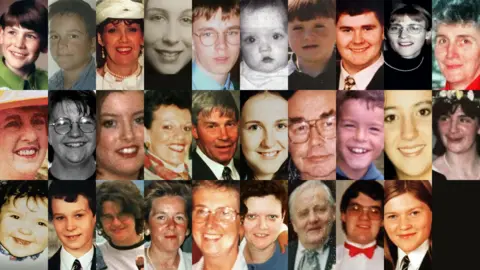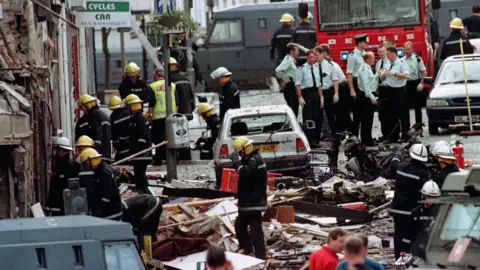Omagh bombing inquiry counsel urges 'pace and rigour'
 BBC
BBCThe inquiry into the Omagh bombing has opened its second chapter with a call for the core participants to "move on with pace and rigour".
Paul Greaney KC, counsel to the inquiry, outlined the need for the core participants to work swiftly to fulfil the inquiry's requirements.
Twenty-nine people, including a woman who was pregnant with twins, were murdered in the Real IRA attack on 15 August 1998.
The public inquiry was established to examine if the attack could have been prevented by UK authorities.
On Monday, barrister Paul Greaney, counsel to the inquiry, told Lord Turnbull the legal team had hoped that disclosure from relevant bodies would have been more advanced than it currently is.
Mr Greaney said the "speed of disclosure to the inquiry by material providers must increase".
He emphasised that state bodies must act with candour, adding that in any case where a statement or document is reported as 'lost', the claim will be subject to "the most intense scrutiny."
He also stated that the chair of the inquiry will not hesitate to use his powers to obtain full disclosure.
Many documents, he said, exist only in hard copy and may take some time to review.
He added that the inquiry would use its powers to ensure the fullest possible levels of disclosure.
Mr Greaney said the inquiry expects openness and transparency from state core participants.
Barrister for the Northern Ireland Secretary, Fiona Fee, told the inquiry that "a significant volume of work" has been undertaken in relation to disclosure.
Some material cannot be publicly disclosed
A number of organisations fall under the remit of the NI Secretary including the UK Intelligence Community (UKIC), the Ministry of Defence (MoD), the Northern Ireland Office (NIO), the Cabinet Office (CO) and the Foreign, Commonwealth and Development Office (FCDO).
Ms Fee said there will be variations on what is disclosed across the secretary of state grouping, adding that there will "inevitably" be material that cannot be disclosed in open but will be provided to the inquiry chairman.
She said there will only be a "very limited amount" that UKIC can say in open.
However, Ms Fee said the intelligence sector was "engaging meaningfully" with the inquiry and undergoing "an extremely difficult disclosure" exercise.
On Monday, the inquiry heard from lawyers representing the Police Service of Northern Ireland (PSNI), the secretary of state for Northern Ireland, the Police Ombudsman for Northern Ireland and Sir Ronnie Flanagan, the head of the police at the time of the Omagh attack.
Statements will also be read by lawyers representing families affected by the bombing.
There will be a second day of statements on Tuesday.
PSNI taking 'exceptional step'
Philip Henry KC acted as counsel for the PSNI, which said it is "working with a seriousness of purpose."
However, it also stressed that the collection of relevant material is "painstaking work and must be done meticulously — and that takes time."
The police team working on gathering evidence for the inquiry has been expanded "in strength and numbers."
The PSNI disclosed that it has taken the "exceptional step" of reassigning all its sensitive researchers to the Omagh bombing inquiry for six months, noting that while this will impact other cases, it is a necessary step to meet the inquiry's demands in a timely manner.
Lord Turnbull said the PSNI's statement was informative and encouraging.
The Omagh bombing was 'not inevitable'
Counsel for the Police Ombudsman summarised previous investigations, reviews, and findings led by the body, which could help inform the inquiry.
The inquiry was told that the Police Ombudsman "assures the families of her unwavering determination — and that of her office — to discharge this role fully and conscientiously throughout the inquiry's duration."
Former chief constable Ronnie Flanagan told the inquiry in a statement that he had spent his career committed to preventing attacks like the Omagh bombing "wherever possible."
His counsel said he had acted "in good faith at all times and was motivated by an intention to bring all of those responsible for this crime to justice. That this has not been possible is a matter of great personal and professional regret."
The final opening statement of the day came from Stephen Toal KC, speaking on behalf of some of the victims and survivors.
He said the Omagh bombing was "not inevitable" and that the victims and survivors deserved the full truth.
In February, the inquiry heard 14 days of powerful individual testimonies from relatives who lost loved ones in the explosion.
It also heard from emergency workers and people injured in the attack.
What was the Omagh bomb?
The bomb that devastated Omagh town centre in August 1998 was the biggest single atrocity in the history of the Troubles in Northern Ireland.
It came less than three months after the people of Northern Ireland had voted yes to the Good Friday Agreement.
Who carried out the Omagh bombing?
 PA Media
PA MediaThree days after the attack, the Real IRA released a statement claiming responsibility for the explosion.
It apologised to "civilian" victims and said its targets had been commercial.
Almost 27 years on, no-one has been convicted of carrying out the murders by a criminal court.
In 2009, a judge ruled that four men - Michael McKevitt, Liam Campbell, Colm Murphy and Seamus Daly were all liable for the Omagh bomb.
The four men were ordered to pay a total of £1.6m in damages to the relatives, but appeals against the ruling delayed the compensation process.
A fifth man, Seamus McKenna, was acquitted in the civil action and later died in a roofing accident in 2013.
